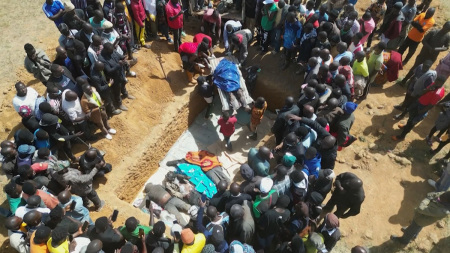European Parliament condemns massacre of Christians in Nigeria, blames climate change

The European Parliament has condemned the Christmas Eve massacre of Christians in Nigeria but attributed the violence to climate change and environmental degradation instead of Sharia law, Islamic extremist groups and the dangers of blasphemy accusations.
During the 2023 Christmas season, Fulani militants killed at least 195 Christians in over 20 communities in Nigeria’s Central Plateau State. The attacks also resulted in more than 300 injuries, the destruction of homes, the burning of eight churches and the displacement of 15,000 people.
The EU resolution states that “the conflict is increasingly described in religious terms, while the perpetrators are yet to be identified and several factors are to be taken into account such as competition for land fueled by rapid climate change and the failure of authorities to hold to account those responsible for violence.”
It further calls on Nigerian authorities “to take meaningful steps to identify and address all root causes of the violence in Plateau state, such as competition for scarce resources, environmental degradation and the disappearance of effective mediation schemes.”
Georgia Du Plessis from the human rights group ADF International criticized the resolution for downplaying the religious motivations behind the attacks, emphasizing that climate change does not lead to the massacre of Christian villages.
In 2021, Nigeria was the deadliest country for Christians, with 90% of global Christian martyrdoms occurring there. An average of 14 Nigerian Christians are killed daily due to their faith.
Members of the European Parliament Bert-Jan Ruissen and György Hölvényi have also voiced concerns over the resolution’s failure to acknowledge Islamic extremism as a primary cause of the violence.
“Saying that it is a mere conflict between farmers and herders fails to acknowledge the other causes. It is Muslim extremists causing death and destruction,” Ruissen said.
“Blinded by ideology, some people are totally insensitive to human suffering when it comes to Christians,” Hölvényi added. “The timing of the attacks, brutal killings, and destruction of churches cannot be misinterpreted and can only be understood as the persecution of Christians and we should be able to say so.”
ADF International said it's also involved in a significant legal case supporting Yahaya Sharif-Aminu, a Sufi Muslim musician sentenced to death under blasphemy laws in Nigeria’s Kano state, challenging the constitutionality of Sharia-based blasphemy laws which could lead to their repeal.
The coordinated attacks by Fulani militias from Dec. 23-26 were described as “pure terrorism” by Plateau State Governor Caleb Mutfwang, which led to calls for a prompt, independent investigation by the United Nations High Commissioner for Human Rights, Volker Turk.
The U.S.-based International Christian Concern has documented the extensive damage and loss of life, calling for the Nigerian authorities to prioritize the arrest and prosecution of the terrorists.
Nigeria has been listed in the ICC’s annual Persecutors of the Year report for the last three years due to the ongoing violence against Christians.
The assailants, often referred to as “bandits,” are a mix of criminal elements, including ethnic Fulani herders and mercenaries from Chad or Niger. They are well-armed and have been active in northern Nigeria for over a decade. Christian leaders believe these attacks are motivated by a desire to take over Christian lands and impose Islam.
Nigeria led the world in Christians killed for their faith in 2022, according to Open Doors’ 2023 World Watch List report, which also noted the involvement of Fulani, Boko Haram, and Islamic State West Africa Province, or ISWAP, in these raids.





















